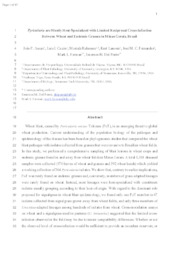Pyricularia are mostly host-specialized with limited reciprocal cross-infection between wheat and endemic grasses in Minas Gerais, Brazil.
Pyricularia are mostly host-specialized with limited reciprocal cross-infection between wheat and endemic grasses in Minas Gerais, Brazil.
Author(s): ASCARI, J. P.; CAZÓN, L. I.; RAHNAMA, M.; LAMOUR, K.; FERNANDES, J. M. C.; FARMAN, M.; DEL PONTE, E.
Summary: Abstract: Wheat blast, caused by Pyricularia oryzae Triticum (PoT), is an emerging threat to global wheat production. Current understanding of the population biology of the pathogen and epidemiology of the disease has been based on phylogenomic studies that compared the wheat blast pathogen with isolates collected from grasses that were invasive to Brazilian wheat fields. In this study, we performed a comprehensive sampling of blast lesions in wheat crops and endemic grasses found in and away from wheat fields in Minas Gerais. A total 1,368 diseased samples were collected (976 leaves of wheat and grasses and 392 wheat heads) which yielded a working collection of 564 Pyricularia isolates. We show that, contrary to earlier implications, PoT was rarely found on endemic grasses and, conversely, members of grass-adapted lineages were rarely found on wheat. Instead, most lineages were host-specialized with constituent isolates usually grouping according to their host-of-origin. With regard to the dominant role proposed for signalgrass in wheat blast epidemiology, we found only one PoT member in 67 isolates collected from signalgrass grown away from wheat fields, and only three members of Urochloa-adapted lineages among hundreds of isolates from wheat. Cross-inoculation assays on wheat and a signalgrass used in pastures (U. brizantha) suggested that the limited cross-infection observed in the field may be due to innate compatibility differences. Whether or not the observed level of cross-infection would be sufficient to provide an inoculum reservoir, or serve as a bridge between wheat growing regions, is questionable and, therefore, deserves further investigation.
Publication year: 2023
Types of publication: Journal article
Unit: Embrapa Wheat
Observation
Some of Embrapa's publications are published as ePub files. To read them, use or download one of the following free software options to your computer or mobile device. Android: Google Play Books; IOS: iBooks; Windows and Linux: Calibre.
Access other publications
Access the Agricultural Research Database (BDPA) to consult Embrapa's full library collection and records.
Visit Embrapa Bookstore to purchase books and other publications sold by Embrapa.

